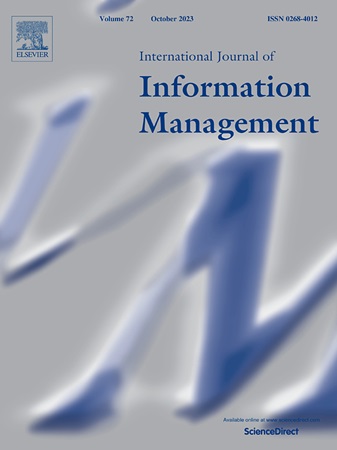可信还是有创意?从双重契合的角度理解驱动用户对人工智能生成内容满意度的机制
IF 27
1区 管理学
Q1 INFORMATION SCIENCE & LIBRARY SCIENCE
International Journal of Information Management
Pub Date : 2025-10-01
DOI:10.1016/j.ijinfomgt.2025.102980
引用次数: 0
摘要
生成式人工智能(GAI)可以从根本上颠覆内容的生产方式,并越来越多地集成到组织和个人的任务执行和决策中。本研究通过扩展双重契合理论,探讨了个人如何感知和处理人工智能生成的内容,从而提高了对用户满意度的理解。在双契合理论的基础上,我们提出两个关键的信息表征(信息可信度和创造力)是用户满意度的关键驱动因素,通过两种不同的中介机制运作:认知契合,反映信息与任务需求的一致性;情感契合,捕捉交互体验与用户情感之间的匹配。我们的模型假设,可信度和创造力都明显影响这些认知和情感契合途径。此外,我们通过探索任务表征(如任务例行性和任务享乐主义)的调节作用来检验边界条件。我们通过两个2 × 2受试者之间的情景实验来检验我们的假设,分别有548和197名参与者。在这两项研究中,结果一致表明,信息可信度对认知和情感契合度都有积极影响。信息创造力主要增强情绪契合度,在特定任务条件下对认知契合度产生影响。这两个拟合维度依次对结果和过程的用户满意度产生积极影响。我们的研究结果表明,任务例行性比任务享乐主义具有更强的调节作用。信息和任务表征之间的良好匹配(即,将可信度与常规任务和创造力与创造性任务结合起来)会增强认知和情感契合度。本文章由计算机程序翻译,如有差异,请以英文原文为准。
To be credible or to be creative? Understanding the mechanisms driving user satisfaction with AI-generated content from a dual fit perspective
Generative artificial intelligence (GAI) can fundamentally disrupt how content is produced and is increasingly integrated into organizational and individual task-performing and decision-making. This study investigates how individuals perceive and process AI-generated content by advancing the understanding of user satisfaction through an extension of dual fit theory. By theoretically grounding our investigation in dual fit theory, we propose that two key information representations (information credibility and creativity) are key drivers of user satisfaction, operating through two distinct mediating mechanisms: cognitive fit, which reflects the alignment of information with task demands, and emotional fit, which captures the match between the interaction experience and user emotions. Our model posits that both credibility and creativity distinctly influence these cognitive and emotional fit pathways. Furthermore, we examine the boundary conditions by exploring the moderating role of task representation (e.g., task routineness and task hedonism). We tested our hypotheses through two 2 × 2 between-subject scenario experiments with 548 and 197 participants. Across both studies, the results consistently show that information credibility positively impacts both cognitive and emotional fit. Information creativity primarily enhances emotional fit, with its effect on cognitive fit emerging under specific task conditions. Both fit dimensions, in turn, positively affect user satisfaction with the outcome and the process. Our results indicate that task routineness is a stronger moderator than task hedonism. A good match between the information and task representations (i.e., aligning credibility with routine tasks and creativity with creative tasks) leads to enhanced cognitive and emotional fit.
求助全文
通过发布文献求助,成功后即可免费获取论文全文。
去求助
来源期刊

International Journal of Information Management
INFORMATION SCIENCE & LIBRARY SCIENCE-
CiteScore
53.10
自引率
6.20%
发文量
111
审稿时长
24 days
期刊介绍:
The International Journal of Information Management (IJIM) is a distinguished, international, and peer-reviewed journal dedicated to providing its readers with top-notch analysis and discussions within the evolving field of information management. Key features of the journal include:
Comprehensive Coverage:
IJIM keeps readers informed with major papers, reports, and reviews.
Topical Relevance:
The journal remains current and relevant through Viewpoint articles and regular features like Research Notes, Case Studies, and a Reviews section, ensuring readers are updated on contemporary issues.
Focus on Quality:
IJIM prioritizes high-quality papers that address contemporary issues in information management.
 求助内容:
求助内容: 应助结果提醒方式:
应助结果提醒方式:


